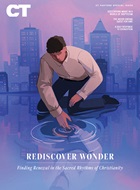A mechanism for cooling the blood—that's what the philosopher Aristotle believed the brain was. Others in the ancient world were even further off the mark. The Egyptians saw the heart as the seat of intelligence. The brain, they believed, was mere "cranial stuffing."
Well, we're not in ancient Athens or Egypt anymore. The brain is still the least understood organ in the human body, but we know a lot more than our ancient counterparts. And we're about to learn a lot more. Neuroscience is in its infancy (imaging devices like fMRIs are barely two decades old) but our knowledge of the brain is increasing exponentially. What Copernicus's heliocentric model did for our understanding of the universe, neuroscience promises to do for our view of the self.
And, some say, our experience of God.
How should Christian leaders respond? Is this new knowledge of our most vital organ friend or foe?
First, some cautions.
Beware the hype. Hardly a day goes by without ...
1
Support Our Work
Subscribe to CT for less than $4.25/month
























